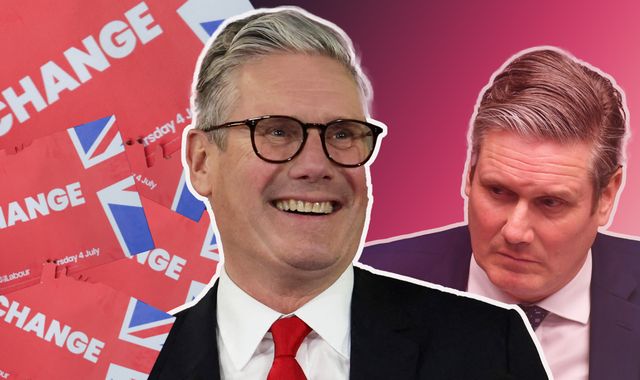Five years after becoming Labour leader, Sir Keir Starmer has been on a remarkable journey. He turned left to win the party leadership and turned right to win a general election.
It has been five years of dramatic highs and lows: the elation of winning a landslide general election victory after the gloom of contemplating quitting following a by-election humiliation.
As opposition leader, Sir Keir purged the Labour left, including banishing his predecessor Jeremy Corbyn to the political wilderness, and flushed out the scourge of antisemitism.
As prime minister, within weeks of entering Number 10 he was confronted with riots on Britain’s streets. And throughout his premiership he has had to play a leading role internationally in a volatile and war-torn world.
At home, his government’s economic policies have been condemned by political opponents and some of his own MPs as a return to austerity. Labour’s opinion poll ratings have nose-dived.
Abroad, as well as the challenge of defending Ukraine against the brutality of Russia’s Vladimir Putin, the so-called “special relationship” with the United States has been tested to the limit by the erratic Donald Trump.
Five-year Keir was elected Labour leader on 4 April 2020, just weeks after prime minister Boris Johnson ordered a COVID lockdown that was ultimately to bring about his demise.
Sir Keir won 56% of the vote, defeating the Corbyn-backed left-wing candidate Rebecca Long-Bailey and Lisa Nandy from Labour’s soft left.
To win the backing of left-wing Labour activists, he backed a wealth tax on the top 5% of earners, abolishing university tuition fees, nationalising water and energy and restoring freedom of movement between the UK and EU countries. Whatever happened to those promises?
There was also a showbiz connection. When he was running for the leadership, a rumour persisted that he was the inspiration for Mark Darcy, the dashing human rights lawyer played by Colin Firth in the Bridget Jones movies.
But, alas for Sir Keir and his spin doctors, who did nothing to dispel the myth, several months after he became leader the Bridget Jones author Helen Fielding laid the rumour to rest – though she conceded they were very similar.
Sir Keir had much bigger battles to fight, however. From day one as leader, he condemned antisemitism as “a stain on our party”. Within weeks he sacked his rival Ms Long-Bailey from his shadow cabinet in a dispute over antisemitism.
But in his ruthless determination to show the party had changed under his leadership, he had a bigger target: his predecessor Mr Corbyn, still the darling of left-wing Labour activists.
After the former leader claimed the scale of antisemitism in the Labour party had been “dramatically overstated for political reasons”, Sir Keir struck, suspending him for refusing to retract his comments and then finally expelling him a month before last year’s general election.
But while he was winning that battle, Sir Keir’s first year did not go well at the ballot box. In 2021, in the first by-election after Boris Johnson’s 80-seat victory in the 2019 general election, Labour lost the previously safe seat of Hartlepool to the Conservatives. The swing against Labour was a huge 16%.
It was his lowest low point of the last five years. Stunned by the Hartlepool defeat, Sir Keir panicked, sacking his chief whip Nick Brown and attempting to demote his deputy, Angela Rayner, stripping her of her posts as party chair and campaign coordinator.
But it backfired as she fought back and emerged stronger than ever. She gained the titles of shadow chancellor of the Duchy of Lancaster and shadow secretary of state for work. Four years later, her Employment Rights Bill is in the House of Lords and on course to become law.
Last year, in a Sky News interview with political editor Beth Rigby, Sir Keir admitted he had considered quitting. “I did, because I didn’t feel that I should be bigger than the party and that if I couldn’t bring about the change, perhaps there should be a change,” he said.
But it wasn’t just the result in Hartlepool that was damaging. In 2022, in a scandal the Conservatives called “beergate”, he and Ms Rayner were accused of breaching lockdown rules by eating curry and drinking beer in Durham while campaigning in the by-election.
He was cleared, but at the height of the Tory onslaught he said he would resign if he was issued with a fixed penalty notice. It was another low point. But in 2022 it was Mr Johnson who was forced to quit over breaking COVID rules, not Sir Keir.
A top civil servant, Sue Gray, produced a damning and ultimately fatal “partygate” report, accusing Mr Johnson of lying to parliament, Liz Truss came and went – her brief 49-day tenure likened to the life of a lettuce – and Rishi Sunak became the Tories’ fifth prime minister in six years.
Sir Keir was on his way. But it was his turn to stun his opponents in 2023 when he announced that Sue Gray was to become his chief of staff, in a move the Tories claimed was treachery and proof that she had been biased against Mr Johnson.
But though she lasted longer than “lettuce” Liz Truss, Sue Gray didn’t survive for long. Within months of Labour’s 2024 election victory she was out, the victim of a vicious power struggle with a Number 10 “boys’ club” led by Starmer’s campaign chief Morgan McSweeney, who helped himself to her job as chief of staff.
On the back of several by-election successes and sweeping local government gains, when Mr Sunak shocked his own party on 22 May by announcing a 4 July general election, Labour entered the campaign as overwhelming favourites to win a big majority.
A turning point in the campaign came on 2 June when Nigel Farage announced a comeback as Reform UK leader and declared that he would, after months of keeping his opponents guessing, be a candidate after all.
As a result, Reform UK won 4.1m votes, piling up votes in the tens of thousands in hundreds of seats, mostly at the expense of the Conservatives, and handing a landslide to Sir Keir: 411 Labour MPs and a majority of 172.
His triumph came close to rivalling Tony Blair’s landslides of 1997 and 2001 with one crucial difference: Labour polled just 34% of the vote, the lowest share for a party winning a majority.
During the campaign, Sir Keir faced tough scrutiny not just about his pledges not to increase income tax, VAT or national insurance, but also about his character and personality.
In “The Battle for Number 10” on Sky News, a 90-minute event in Grimsby featuring Sir Keir and Mr Sunak, the Labour leader froze when a member of the audience told him he seemed like a “political robot”.
He also squirmed when another audience member challenged him on why he now condemned Mr Corbyn when five years earlier he told voters he would make a great prime minister.
Yet despite those difficult moments, the event was more bruising for Mr Sunak than Sir Keir and a YouGov poll declared a decisive victory for the Labour leader, by 64% to 36%
But there was to be no honeymoon period for Sir Keir after Labour’s landslide. Within days of his election victory, riots following the killing of three young girls at a dance class in Southport presented the new prime minister with a law and order crisis.
His background as Director of Public Prosecutions served him well, however, and he showed a steely determination in ensuring rioters were dealt with swiftly and severely by the courts, though critics hit out at inconsistencies in sentencing and branded him “Two-tier Keir”.
Another crisis was self-inflicted. Many in his own party were shocked by the staggering amount of freebies, gifts and hospitality he and his wife accepted since he became Labour leader, many paid for by a millionaire Labour donor Lord Alli. According to a Sky News investigation, their total worth was more than £100,000.
They included expensive clothes for the PM and his wife, luxury designer spectacles for Sir Keir, hospitality at his beloved Arsenal FC, free accommodation in a flat owned by Lord Alli and – perhaps the most contentious – freebie tickets to a Taylor Swift concert at Wembley Stadium, all worth eye-watering amounts.
To make matters worse, the “freebie-gate” scandal engulfed the PM at a time when his chancellor, Rachel Reeves, was cutting winter fuel payments for pensioners, the first of a series of controversial moves by the woman derided as “Rachel from Accounts” by political opponents that have badly damaged Sir Keir’s government in its first nine months.
The two-child benefit cap, national insurance rises in her October budget, benefit cuts last month and no compensation for the so-called Waspi women have all infuriated many Labour MPs and put Sir Keir’s loyalty to his chancellor under strain.
He’s standing by her for now. “I have full confidence in the chancellor,” he declared, tetchily, when challenged by a Tory MP at PMQs just minutes before her spring statement last week.
But for how long? Most prime ministers eventually fall out with their chancellor: Margaret Thatcher with Sir Geoffrey Howe and then Nigel Lawson in the 1980s and later Tony Blair and Gordon Brown. Be warned, Rachel!
On foreign policy, the PM’s record is better. His baptism on the world stage, at a NATO summit in Washington in his first week as PM, helped him swiftly establish a reputation as a safe pair of hands and reliable ally on foreign policy.
Though the UK is no longer in the EU, Sir Keir has forged strong alliances with European leaders – particularly France’s President Macron – as he attempts to build a “coalition of the willing” to defend Ukraine. And he has won the trust of Ukraine’s President Zelenskyy.
And on his biggest foreign policy challenge, establishing good relations with the maverick President Trump, the verdict – even after the president’s tariffs bombshell – is so far, so good.
His Trump Tower dinner last September went well, his White House stunt with an envelope containing King Charles’ state visit invitation was a diplomatic masterstroke and the 10% tariffs slapped on the UK could have been a lot worse.
Now comes the really hard part for Five-Year Keir: securing a trade deal with the US, bringing peace to Ukraine without a sell-out or concessions to Vladimir Putin, smashing the gangs smuggling illegal migrants, tackling welfare reform and – the biggest challenge – finding that elusive economic growth at home while the Trump tariffs make autumn tax rises look almost inevitable.
No pressure, then prime minister. If the lows of Sir Keir’s first five years as Labour leader took the shine off the highs, the next five years – to the next election and perhaps beyond – look even more challenging.
And the journey from Doughty Street to Downing Street is now just a distant memory.






























